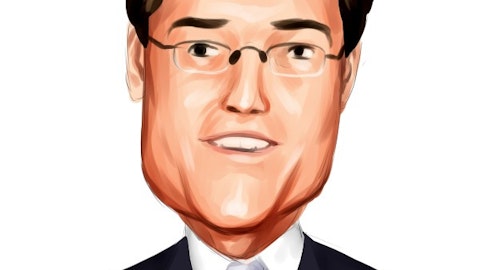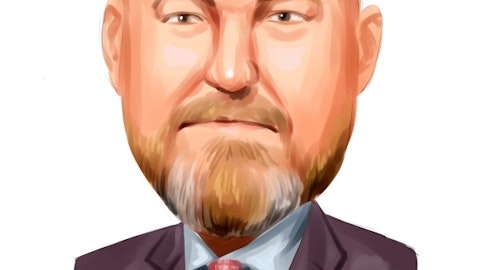Duluth Holdings Inc. (NASDAQ:DLTH) Q3 2022 Earnings Call Transcript December 6, 2022
Operator: Good day, and welcome to the Duluth Holdings, Inc. Third Quarter 2022 Conference Call. All participants will be in listen-only mode. Please note this event is being recorded. I would now like to turn the conference over to Nitza McKee. Please go ahead.
Nitza McKee : Thank you, and welcome to today’s call to discuss Duluth Trading’s Third Quarter Financial Results. Our earnings release, which was issued this morning is available on our Investor Relations website at ir.duluthtrading.com under Press Releases. I am here today with Sam Sato, President and Chief Executive Officer and Dave Loretta, Chief Financial Officer. On today’s call, management will provide prepared remarks and then we will open the call to your questions. Before we begin, I would like to remind you that the comments on today’s call will include forward-looking statements, which can be identified by the use of words such as estimate, anticipate, expect and similar phrases. Forward-looking statements by their nature involve estimates, projections, goals, forecasts and assumptions and are subject to risks and uncertainties that could cause actual results or outcomes to differ materially from those expressed in the forward-looking statements.
Such risks and uncertainties include but are not limited to those that are described in our most recent annual report on Form 10-K and other SEC filings as applicable. These forward-looking statements speak only as of the date of this conference call and should not be relied upon as predictions of future events. And with that, I’ll turn the call over to Sam Sato, President and Chief Executive Officer. Sam?

Sam Sato : Thank you for joining today’s call. We are in the midst of our peak season when direct order volume and store traffic are at the highest levels. So I look forward to providing insights on the trends we are experiencing and the great work our teams are doing to deliver against evolving consumer expectations and execute on our strategic playbook. I am also excited to share updates on our brand positioning and critical investments we are making to position our business for long-term growth. We are committed to staying the course on our Big Dam Blueprint initiatives in the phase of many macroeconomic headwinds that we are experiencing today and expect to continue into 2023. While the current environment does pose some near-term challenges for the business, our efforts remains focused on unlocking the company’s full potential for sustainable growth.
We are all in on the commitment to support scalability and further enable Duluth to deliver long-term growth and profitability. I’ll share further detail on some of the key initiatives shortly, but at a high level, we’ll continue to execute against our commitments on leading with a digital-first mindset, supported by investments in our logistics and technology infrastructure and in product development and new innovation, while driving brand awareness across our evolving portfolio of sub-brands. But first, regarding our current business, I am pleased to share that we’ve seen several key trend reversals that point to progress in the areas that have been our focus. Most notably, total net sales for the company grew 1.3% in the third quarter, a sequential improvement of 770 basis points when compared to the first half of the year.
Driving that growth was our direct channel, which was up 7% in Q3 versus down 6% in the first half of the year. I’ll share more regarding the positive initiatives around inventory management, marketing execution and new product introductions that are supporting this growth. But I would be remiss to not mention upfront that we are seeing the impacts of the inflationary environment on our core consumer with a higher level of price sensitivity. This is resulting in a reduction in the overall basket size and lower levels of full price selling in both our direct and retail channels. The good news is we saw consistent and strong shopper conversion, a clear indication our brand, sub-brands and products are resonating. In high core inflationary environments like we are in, where many consumers face strains on their pocketbook the price value balance in their discretionary purchase decisions can tilt in the direction of value.
In response to the customers’ need to balance their own spend decisions, we have strategically and selectively increased our mix of discounted offers and extended some sale event periods to meet these adjusting expectations. Our product offering is centered around fulfilling customers’ needs for durable, long-lasting gear and apparel that meets a high-quality standard with an appropriate price value proposition. But we understand for some trade-offs are made between the need to cover the rising cost of staple items and investing in their apparel and accessories. The demand for Duluth trading products has remained strong. That said, to address the evolving consumer and macro environments, we focused on critical levers to maximize opportunities.
For example, to minimize supply chain risks like we experienced last year, we plan to receive inventory sooner to ensure improved in-stock positions as we headed into Q4. We adjusted the mix of our marketing tactics to maximize efficiencies and we strategically post promotional activity to capitalize on consumer demand while maximizing profitability. These efforts materialized in the third quarter as we realized a 9% increase in units sold and customers who have been with us the longest or the highest retained group of customers. These results speak to our flexibility and agility as we continue to read, react and adjust to the rapidly changing consumer and macro conditions. As a result of the price sensitivity we are seeing from the customer, we took appropriate actions aligned with the ship resulting in contraction in our selling gross margins impacting the bottom-line results.
Today, we reported a net loss of $0.19 per diluted share and positive adjusted EBITDA of $1.7 million. While we are not satisfied with these results, we are confident that keeping our inventory clean, generating cash flow and continuing to meet the customers’ evolving expectations will serve us well and allow us to continue investing in the strategic priorities we have set for the business. Our overall inventory position, while up 24% to last year is down 4% to the same period in 2020. As I mentioned earlier, we front-loaded inventory receipts to de-risk supply chain challenges by taking early delivery of Q4 goods in Q3. Our strategic actions to be in stock at all times in our core year-round items is paying off. We can flex our position in these categories in shorter time frames and make adjustments relative to quarterly demand trends.
Dave will share more about how we expect inventory flow and year-end position to play out. Importantly, our current overall inventory is in a healthy position to support peak holiday shopping. From a seasonal merchandize standpoint, our fall/winter offering is off to a great start. Sales of seasonal styles were up 8% in the third quarter, driven by flannels, fleece, shirt jacs and line pants. It took a little longer for the weather to turn colder this year, but when it did, our mix of transition and cold weather items took off. In Duluth women’s, the folklore flannel collection featuring several styles and patterns have seen standout performance. As has the frostlake collection of fleece tops featuring supersoft, anti-pilling fabric and cut shaping that is suitable for wearing alone or as an extra layer.
New in the Duluth women’s business this season is the shiftless sweater collection that we’ve designed with the classic V-Neck, Crewneck and Turtleneck options, as well as the Cardigan industrial style with extra length for comfort and freedom of movement that our customers expect. Overall, our women’s business increased 10% in the third quarter, with positive gains in the Duluth branded collections while we also continue to see strong momentum within the AKHG sub-brand. After a successful introduction of AKHG Women’s in the spring, our fall/winter assortment is being led by the Meltwater First Layer program and the Midnight Sun Flannel program. Combined, our women’s business increased to 31% of total sales in Q3, compared to 28% last year and has grown significantly up 35% since 2019.
The investments we’ve made in product innovation and great brand marketing to build out our women’s assortment is paying off by cementing Duluth Trading Company as truly a co-gender lifestyle brand. Importantly, the proportion of new buyers is closely approaching a 50-50 split between men and women with the number of female shoppers at the highest peak in the past three years. With the great success we are seeing in our women’s business, we are excited to have recently launched a reconfiguration in 20 of our stores that expands our Women’s footprint. The expansion is informed by customer research and focus group insights, highlighting the desire to allocate more space to our women’s assortment and balance the shopping experience. These stores have already produced better-than-average results so far this holiday season.
We see great opportunities in Women’s and we’ll continue to focus on this segment of our business as a strategic pillar. Within our Men’s business, we realized growth in apparel across the three sub-brands of Duluth, AKHG and Best Made. Our Men’s pants program continues to be a dominant category for our company where many of our top volume items live and where workwear innovation is integral to our success. A good example is the Men’s Ballroom Double Flex Relaxed Fit Carpenter Jean, a top new product performing this quarter by a wide margin. While we introduced Duluth Double Flex Denim several seasons ago, we leveraged our Double Flex Denim innovation into a carpenter style which blends proven innovation with updated styling and functionality and has quickly become a customer favorite.
Another great example of driving success by offering more choices is in our Men’s Longtail T collection. We reintroduced an additional style called the Un-Longtail T that shortens the length, adjust the fit and provides more color choices to further enhance our staple work shirt offering, complemented by a new intuitive web selection guide, our customers can more easily browse the many options and find their perfect mix of size, color, and features. Overall, the Longtail T program drove a mid-single-digit increase during Q3. We did experience some softness in our Men’s unders business this quarter and while unit sales in the overall under business was up high-single-digits, average unit prices were down due to the higher promotional actions leading to a low-single-digit decline in net sales.
We are seeing the men’s underwear customer become increasingly more price-sensitive and value-driven. This trend has been the opposite in women’s, however, with net sales in the category up high-single-digits driven by high growth in underwear, bras and our famous No-Yank Tanks. We also introduced our new line Tamer collection in Q3 offering an innovative, seamless solution for women’s bras and underwear. Newness in our unders business is just as critical as other categories, highlighted by another top new product this quarter. The men’s Funk No! Bullpen Boxer Brief was among the top new items this period and demonstrates that innovation and uniqueness will break through. Of the recently introduced collaboration with the Green Bay Packers for co-branded Packers theme clothing, the Men’s Buck-Naked Cheese pattern boxer brief has been a top-selling item so far this season.
We are also excited to see the success that broadening our AKHG sub-brand to Women’s has had on the overall brand growth. AKHG increased nearly 45% in the quarter due in large part to the introduction of Women’s. Men’s AKHG also saw a healthy growth of mid-single-digits in the quarter, driven by new programs such as Blackburn and Crosslayer, which features pullovers, hoodies and vests and in Meltwater base layers, dramatically improved in-stock positions compared to last year helped drive increases in our Boar’s Nest and cross-style collections which features sweatpants, sweatshirts and flannels. Overall, we see AKHG having outsized growth potential and can aggressively compete in the sizable outdoor recreational apparel space. And to support this growth opportunity, we plan to increase our brand building investments in AKHG in future seasons.
More near term, our marketing focus to drive brand growth has been to prioritize digital channels with paid advertising and personalized communication across our own channels, e-mail and brand followers and influencers. During the third quarter, we realized a mid-single-digit increase in total customer counts and repeat buyers with success in reactivating customers that haven’t purchased in more than a year. Tactically, we were able to increase this segment of lapsed buyers in the quarter by over 30%. We increased our working media investments in Q3 by roughly 15%, which helped drive an increase in web visits in the quarter by 6% and mid-single-digit sales growth in September and October. In addition, we tested digital messaging to drive store traffic in 15 local store markets that led to increases and we have broadened the investment in all our store markets for the holiday season.
The increase in web visits and direct sales in the third quarter came through a mobile device with desktop and tablet essentially flat. Not coincidentally, we saw outsized customer growth coming from the younger age cohorts who are more apt to transact on their mobile device. As we’ve shared in our Big Dam Blueprint, targeting a younger customer in the age range of 40- to 50-year-old with our product offering and marketing mix is gaining traction. With our average customer reach today in the mid-50s, we are actively balancing our mix of advertising to both target and build visibility with our 40 to 50-year-old target customer while maintaining visibility within media channels that index well with the older demographic. In Q3, we observed that the content consumption behavior of our target 40 to 50-year-old customer is becoming more fragmented meaning that they consume content in multiple channels, including more streaming platforms, cable TV, YouTube and streaming audio.
As such, building awareness with the customer must be selective, focused and intentional by channel. For example, within digital channels, social platforms indexed well with the female buyer and proved to be successful in driving sales from new younger female buyers in the quarter. YouTube specifically indexes well with males aged 40 to 50, along with social channels. Our success long-term will be driven by the learnings we’re gaining now about our target customers’ media consumption and how to appropriately best flex the mix of working media investments. Related to the investments we make in working media, I am excited to share news about our recent website replatform that has meaningfully improved the user experience and transactional performance of the duluthtrading.com site.
In October, we successfully relaunched our website using headless site architecture known as a progressive web application. The improvements to site speed upon launch have been meaningful and customers are taking notice. We believe this investment will drive a lift in site conversion and engagement going into peak especially for those customers who choose to shop on their mobile device. Next year, this new platform will allow us to progress our digital experiences faster than ever before by enabling more rapid enhancements, richer digital storytelling and quicker upgrades for third-party tools such as new site search functionality. We have recently completed key investments in our logistics operations and met critical milestones in our Southeast fulfillment center project.
Between our existing Belleville and Dubuque facilities, we have increased the speed and capacity for sorting and relaying inbound inventory and we have automated scanning and manifested printing on outbound orders that will save freight costs. The efficiencies we are seeing in managing fulfillment costs are directly related to the value these investments are bringing. In addition, our inventory position between fulfillment centers and stores is in great shape and has contributed to the outstanding work our store teams are doing to convert traffic to sales by having the right inventory in the right place. In the Southeast fulfillment center project in Adairsville, Georgia, we are on schedule with the facilities infrastructure in place and the delivery of the auto store material equipment is ahead of schedule.
Our plans are to go live during Q3 of next year. Regarding our technology strategy, under the direction of our new Chief Technology Officer, we have strategically redirected our technology investments and have prioritized a new warehouse management system to advance our Southeast fulfillment center capabilities and have paused on the upgrade of our current ERP system. The upgraded cloud-native versionless warehouse management system will provide end-to-end supply chain and logistics process orchestration, resulting in vastly improved inventory management and turns. The prudent management of expenses is always heightened in our business, but in the inflationary environment and uncertain consumer outlook that exists today, we are acutely focused on ensuring that operating and capital outlays we make are core to supporting our strategic priorities.
With that, the heightened levels of macro and consumer uncertainty that have weighed on our business in 2022 is impacting our plans for 2023. That said, I want to again emphasize, we will continue to control our cost and conservatively plan our inventories, but we remain steadfast on carrying out our Big Dam Blueprint which serves as the foundation for Duluth Trading company’s long-term success and value creation. Now I’ll turn the call over to Dave to provide more details on our third quarter results and discussion of our year-end outlook. Dave?
See also 11 Best Quality Stocks To Buy and 12 Best Media Stocks To Buy.
David Loretta : Thanks, Sam, and good morning. For the third quarter, we reported net sales of $147.1 million, up 1.3%, compared to $145.3 million last year and up 8.6%, compared to the same period in 2020. Our direct channel sales were up 6.8% from last year, which included online sales growth in store markets of low-double-digits and in non-store markets of low-single-digits. Our retail channel was down 6.6% in the quarter representing a significant improvement to the trend in the second quarter of over 500 basis points and benefited from outstanding conversion of the store traffic to sales of over 300 basis points. Traffic to our stores is still below the prior year, but has improved to being down mid-single-digits versus mid-teens in the second quarter.
Total net sales growth was strongest in our established Midwest, Southeast and Northeast markets. As we shared on our last call, better supply chain flow and targeting earlier receipt dates on our inbound inventory positioned us well during the third quarter and better supported our transition into the fall and winter season. Sales turned positive in early September and continued through October, up mid-single-digits to last year. As planned, we increased the marketing investments during the quarter to align with the inventory position and focused our messaging on new seasonal products, our women’s AKHG launch and driving traffic for our annual Big Dam Birthday sale event and our preseason global sale event in the end of October. As we entered the fourth quarter, holiday shopping was slow to get started relative to last year’s industry push to get consumers to buy early.
The first two weeks of November during the mid-term elections, sales were down mid-teens. For the last two weeks of November, sales were down high-single-digits to last year, and that trend continued for the four day period of Black Friday through Cyber Monday. We are seeing a more near-term ramp-up of gift-giving shopping, supported by a healthier inventory position that is helping to convert traffic into sales in both our store and direct channels. We are beginning to lapse easier sales growth comparisons in the months of December and January. That said, given broader consumer headwinds and impact on discretionary spending, we are lowering our fourth quarter and full year sales and earnings outlook. As Sam shared, the strategic targeting actions to retain and reactivate customers produced healthy results in our buyer file where we are now realizing an increase in the year-to-date retention rate compared to last year, which is being driven by customers who have been with us for greater than one year.
Our third quarter gross profit margin was 52.3%, compared to 57.6% last year. This represents an 8% decline in gross profit dollars to $76.9 million in the third quarter, which was a result of a shift in mix from full price to promotional price selling and indicative of the customer being impacted by the inflationary environment and responding to price promotions more than in the past. Importantly, as we took action to be in stock on seasonal items coming out of the summer, we ended the quarter up roughly 40% in our fall/winter assortment that has supported the sales growth and filled our stores with the necessary inventory to drive holiday shopping. Additionally, we are keeping our eye on the merchandise mix and taking markdown actions on slow-moving items to prevent the end-of-season buildup.
Our level of clearance inventory currently at mid-single-digits as a percentage of total is in a good spot for where we are during the season. Turning to expenses, SG&A for the third quarter increased 7% to $84.3 million, compared to $78.8 million last year. As a percentage of net sales, SG&A expense increased to 57.3%, compared to 54.2% last year. This included an increase of $2.4 million in general and administrative expenses, $1.8 million in advertising and marketing expenses and an increase of $1.3 million in selling expenses. Selling expenses as a percentage of net sales increased 70 basis points to 17.1%, compared to 16.4% last year and was driven entirely by higher shipping cost on outbound customer shipments due to fuel surcharges and a greater mix of direct sales versus store sales during the quarter.
We managed our variable costs very well during the quarter with our store and fulfillment center operations, delivering labor efficiencies and flexing their controllable costs. We expect to realize slight deleverage in selling expenses in the fourth quarter due to the higher outbound shipping costs related to ongoing fuel surcharges and the expected mix of sales weighted more towards the direct channel. Advertising and marketing costs were $19.6 million in the quarter, compared to $17.7 million last year and as a percentage of sales increased 110 basis points to 13.3%, compared to 12.2% last year. An increase in the paid digital media channels and shifting some catalog circulation back into the third quarter drove the higher marketing spend.
As Sam noted, we are making purposeful adjustments to the media channel mix in the interest of gaining more visibility to our target customer of 40 to 50-year olds’ while maintaining presence with our existing customers in the traditional linear TV channels. In traditional TV media flights, we measure the spikes in brand search volume and new website visits during the high impact placements particularly during sporting events. In addition, we launched our first TikTok takeover placement on National Underwear Day in early August and realized over 50 million impressions and awareness that drove visit store underwear collection online. We expect our advertising and marketing costs will be below last year in the fourth quarter, but will it include a greater mix of digital media tactics up nearly $2 million focusing on new product arrivals and innovation.
We expect to realize slight deleverage in Q4 given the increase in the Q3 spend and the shifts we made in the prior year to better align with our inventory position in the back half of the year. General and administrative expenses as a percentage of net sales increased 130 basis points to 26.9%, compared to 25.6% last year. The $2.4 million increase from last year represents personnel and technology costs, as well as fixed costs for our new Southeast fulfillment center that is scheduled to open in the third quarter of next year. Additionally, related to the decision to re-prioritize technology initiatives and pause the ERP upgrade, we have taken a one-time write-down of $1.1 million related to the implementation costs incurred in the early stage of the project.
We expect our fourth quarter overhead expenses will be below last year as we realized savings in personnel and incentive costs due to the expected lower full year sales and earnings and be roughly flat on a percentage of sales in Q4, compared to last year. As of today, our store count stands at 65 with no planned store openings for the balance of the year. Adjusted EBITDA for the third quarter was $1.7 million, our net loss for the third quarter was $6.2 million or $0.19 per share, compared to $0.09 per diluted share profit reported in the third quarter last year. On a year-to-date basis, our operating income, absent the ERP capital project write-down and associated operating expenses, as well as expedited freight costs totaling approximately $6.3 million would have been positive.
With our year-to-date sales down 3.8%, generating positive operating income, while we are making the strategic investments to support long-term growth highlights the underlying health of our business model. Moving on to the balance sheet, we ended the quarter with net working capital of $98.7 million, including $9.4 million in cash and $10 million outstanding on our line of credit, which has since been paid off. The increase in inventory, compared to last year and related decrease in cash and use of the line of credit were driven by the strategic decision to improve our inventory flow. Our inventory level is 24% higher than last year at quarter end and is in a healthier position with more timely receipt of both year-round and seasonal goods.
Compared to two years ago, inventories are slightly down and reflect our objectives of being more efficient in driving increased inventory turns. The increase in total inventory units is roughly 19% over last year with the delta to our total dollar increase, reflecting higher average costs and a shift in the mix of balances with growth in our Women’s collections and AKHG sub-brand. At the midpoint of our revised sales guidance, we would expect to end the year with inventories up mid-teens, compared to last year and down low-double-digits compared to 2020. Our capital expenditures year-to-date of $24 million, including the cost of software implementation is in line with our plans. Our outlook for the full year of CapEx is reduced to $35 million reflecting the reprioritized technology initiatives, but continued investments in logistics automation, the expansion of our fulfillment network with the new facility in the Adairsville, Georgia, and retail store test and learn initiatives such as the women’s footprint expansion that Sam discussed.
We remain confident that the strategic priorities outlined in our Big Dam Blueprint and resulting capital investments are the keys to driving growth longer term in our business. Since the introduction of our strategic road map a little over a year ago, we’ve made many strides and completed key initiatives such as, the re-platforming of our website enabling the Progressive Web App technology, the launch of Phase 1 of our merchandizing life cycle management suite of tools, the expansion of our marketing technology that has allowed us to identify and leverage customer data analytics and adjust our marketing mix to drive digital traffic and the completion of our customer journey mapping to inform actions that elevate the in-store experience. In addition, we have completed the remodel of our St. Charles, Missouri store to test a new customer informed design including a new floor plan, fixturing and signage package and we’ve expanded the Women’s footprint in 20 of our stores to elevate growing Women’s business.
Moving to our outlook for the fourth quarter and full year. We now expect sales in our direct channel to be down mid-single-digits in the fourth quarter. For retail sales, we expect to be down to prior year high-single-digits in the fourth quarter. With a higher promotional sales environment, we expect gross profit margin to be down roughly 350 basis points in the fourth quarter with the full year gross profit rate down year-over-year, 180 to 200 basis points. Advertising expense in the fourth quarter will be roughly $3 million less than last year as planned. With selling expenses, we expect the fourth quarter to be flat to down 30 basis points as a percentage of sales. Overhead expenses will be roughly $2 million less than last year in the fourth quarter.
We are updating our full year guidance with net sales of $650 million to $680 million, adjusted EBITDA of $42 million to $49 million and EPS in the range of $0.05 to $0.20 reflecting a wider range due to the heightened uncertainty with consumers’ holiday spend activity and the impact from heavier promotional pricing environment. Our teams remain focused on executing a great peak season push and managing what is in our control. Sam, I and the entire leadership team would like to wish all a happy and healthy holiday season. And with that, we’ll open the call for questions.
Q&A Session
Follow Duluth Holdings Inc. (NASDAQ:DLTH)
Follow Duluth Holdings Inc. (NASDAQ:DLTH)
Receive real-time insider trading and news alerts
Operator: Thank you. Our first question comes from Jonathan Komp with Baird. Please go ahead.
Jonathan Komp : Yeah, hi. Good morning. Thank you. I want to just maybe gauge your overall sense of the trends you are seeing in your business. I know you highlighted the third quarter, some of the sequential improvement you saw in both channels, but it looks like the fourth quarter, you are embedding the opposite, the return to negative year-over-year performance for both direct and retail. So, what do you make of sort of the trends you are seeing? And then given some of the commentary, do you think it’s going to be hard not to still show sales declines going into the first half of next year?
David Loretta : Yeah. Hi, John. Where we were seeing some of the trends that I mentioned on the call coming out of our third quarter, November, the first two weeks, in particular were kind of the toughest and we attribute a portion of that to the early shopping as last year. And so, earlier in November, going up against tougher comps last year, our November, we posted an increase over the prior year of low teens. And so we are comp €“ it was the toughest month for us to comp. But going into December and January, we’re comping easier periods relative to last year, both from the sales trends, shopping behavior and our inventory position was really tough as we move through December. So, as I mentioned, the more near-term trend of down kind of high-single-digits that we saw coming through the back half of November through Cyber Monday is really where we expect some of the rest of the period to play out, but with more upside in the coming weeks than what we felt in the first part of the quarter.
But that being said, I think we are looking into next year and we’re still planning it. We had inventory issues in the first half of last year in the first quarter in particular. And so I think we’ll see some momentum because of that. But the overall consumer backdrop, at least as we’re seeing it, isn’t going to drive a significant growth over the next few months.
Jonathan Komp : Thanks. That’s helpful. And maybe a follow-up then to understand how you’re planning the organization. The margin for the business this year will be the lowest that €“ isn’t our model looking backward? And I’m just curious if the sales were not according to your plan and stayed negative, how long would it take or how much pressure would you need to see incrementally on the top-line before you took a different approach to the operating structure or the cost structure of the business, maybe anything more drastic than the current actions you’ve outlined to slow some of the incremental spend?
Sam Sato : Yes. Jonathan, this is Sam. Yeah, so a couple of things. We’ve got some expense flexibility within OpEx specifically. Our intentions at this stage, while the near-term challenges certainly are impacting our results, we are currently focused on unlocking the company’s full potential longer term and as we talked last year, just really beginning the journey of infrastructure and technology investments. And we’ve got a number of things that are in the works and certainly, we’re excited about where we are with Adairsville and what value that will create, the pivot to a different warehouse management system that will allow us to optimize that investment in Adairsville is exciting and in fact, I think it lowered our CapEx spend next year to $35 million or something like that or this year, yeah.
And so, as we think about next year, while at a high level, we’re going to stay the course on our investment strategy for the long-term. We also recognize the importance to manage the business as well. And so as we’ve always said, we are acutely focused on managing expenses. We are being highly critical of investments that are outside of kind of the must-haves to deliver our strategic initiatives and as we think about next year and as Dave said, we’ll share more on our next call as we’re finalizing the plans for 2023. We are going to take a really conservative approach, not just to sales and margins but also expenses, capital, but also not take a short-term look necessarily in our strategic initiatives and what investment requirements will be necessary to unlock that.
Jonathan Komp : Understood. Thanks for sharing the color.
Sam Sato : Yes. You bet.
Operator: Our next question comes from Jim Duffy with Stifel. Please go ahead.





